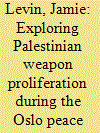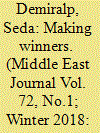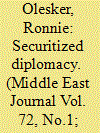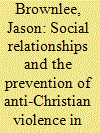| Srl | Item |
| 1 |
ID:
157525


|
|
|
|
|
| Summary/Abstract |
The Oslo peace process created a Palestinian police force for the purposes of law enforcement and preventing terrorism. However, Israel soon accused the Palestine Liberation Organization (PLO) of creating a paramilitary force as a means to spoil the peace process and achieve by force what it could not through negotiations. Others argued that PLO chair Yasir 'Arafat was engaged in coupproofing the fledgling Palestinian Authority (PA). This article proposes that the PLO's weapons proliferation was meant as an insurance policy to deter Israel from reoccupying the Palestinian Territories.
|
|
|
|
|
|
|
|
|
|
|
|
|
|
|
|
| 2 |
ID:
157527


|
|
|
|
|
| Summary/Abstract |
This study focuses on the distribution of the costs and benefits of Turkey's urban policy. Since 2002, the Justice and Development Party (AKP) government has embraced an ambitious form of capitalism that privatized the benefits of urban transformation while socializing its costs. The government has also adopted populist strategies that enhanced its political support among upper- and lower-income groups and left urban transformation's costs to fall disproportionally on the middle class.
|
|
|
|
|
|
|
|
|
|
|
|
|
|
|
|
| 3 |
ID:
157524


|
|
|
|
|
| Summary/Abstract |
Since 1955, Lebanon has had a policy of boycotting Israel in international sporting tournaments. While this policy can be credited with expelling Israel from pan-Asian sporting events in the 1970s, this article argues the main victims of Lebanon's boycott have been Lebanese athletes and Lebanon itself. While some countries such as Iran have followed the Lebanese example, countries like Qatar and the United Arab Emirates have developed a more pragmatic approach.
|
|
|
|
|
|
|
|
|
|
|
|
|
|
|
|
| 4 |
ID:
157523


|
|
|
|
|
| Summary/Abstract |
This article addresses the Israeli demand during the 2013–14 peace negotiations that Palestinians recognize Israel as a Jewish state within the context of securitization theory. Contrary to many readings, this article argues the demand was not merely a tactical ploy to delay or derail the peace process but rather was part of a broader process of making Israel's Jewish identity a matter of national security. The application of securitization theory beyond the liberal nation-state is also examined.
|
|
|
|
|
|
|
|
|
|
|
|
|
|
|
|
| 5 |
ID:
157526


|
|
|
|
|
| Summary/Abstract |
Institutionalist accounts of sectarian and ethnic conflict tend to emphasize national divisions. For the "master cleavages" of identity politics to shape behavior, however, they must be reproduced at the local level. Otherwise, citizens will not experience private disagreements in terms of officially promoted differences. This finding comes from extensive fieldwork on collective assaults upon Christians in Qena, Egypt. The Egyptian state favors Muslim citizens over Christian citizens, but in Qena local practices eclipsed this national hierarchy. The likelihood of attacks on Christians depended not on how the state categorized Egyptian governors (Muslim or Christian), but whether the governors reproduced Muslim primacy in their social relationships.
|
|
|
|
|
|
|
|
|
|
|
|
|
|
|
|